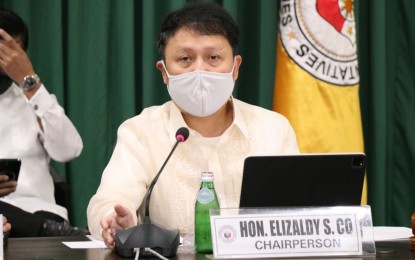
House Appropriations Committee chair, Rep. Elizaldy Co has vowed to ensure the timely approval of the P5.268-trillion 2023 national budget that it hopes will help realize the Marcos administration’s agenda for economic transformation and prosperity in the wake of the pandemic and inflation.
During the plenary deliberations on the General Appropriations Bill, Co said the proposed 2023 budget is anchored on the budget theme “Agenda for Prosperity: Economic Transformation Towards Inclusivity and Sustainability,” with an overarching objective of economic transformation.
Co explained that the spending measure has three main pillars focused on strengthening the purchasing power of Filipinos; reducing vulnerability and mitigating scarring from the Covid-19 pandemic; and enhancing bureaucratic efficiency.
In his sponsorship speech for the bill, Co said “the President’s budget message clearly underlines that the overall goal is to reinvigorate job creation, reduce poverty by steering the economy back to its high-growth path in the near term, and sustaining its high, inclusive, and resilient growth in the long term.”
Co said the proposed budget also embodies the 8-point socio-economic agenda of the Marcos administration which include food security; improved transportation; affordable and clean energy; health care; social services; education; bureaucratic efficiency; and sound fiscal management.
“The 8-point socio-economic agenda is an action plan for the immediate recovery of the economy from the lingering effects of the Covid-19 pandemic. The near-term objective is to address rising inflation driven by internal and external factors, socio-economic scarring, and low income,” he said.
Co said the proposed 2023 budget is 22.2% of the gross domestic product (GDP). This is 4.9% higher or P244.4 billion more than this year’s budget of P5.023 trillion.
He said the national government expects revenue collections in fiscal year (FY) 2023 to reach P3.633 trillion or 15.3% of GDP, to finance the budget. He said the expected revenue will fund about 69% of the P5.268 trillion programmed disbursements for FY 2023, obliging the national government to partly finance through borrowings about 31% of the expenditures.
“In solidarity and with a united front, we shall be able to deliver the necessary tools and resources with this budget to improve the lives of our constituents and uplift their hope for a better quality of life and future prosperity and advancement of the Filipino people,” Co stressed.
Marikina City Representative Stella Quimbo, for her part, said the 2023 General Appropriations Bill focuses on growing vital sectors of the economy and is the “first step in fulfilling the visions” of the current administration’s Medium Term Fiscal Framework (MTFF) to create more jobs and reduce poverty.
Quimbo, House Appropriations Committee Vice-chair, said around P852.8 billion of the GAB will go to the education sector next year to fund the safe return to face-to-face classes, the construction and rehabilitation of school facilities, and the provision of educational assistance.
Health spending, she said, will amount to P301 billion, which shall be spent on medicines and vaccines, improvement of health facilities, healthcare worker benefits, along with the indirect contribution of the Philippine Health Insurance Corporation (PhilHealth).
The overall allocation for agriculture and agrarian reform is P184.1 billion with the Rice Program, National Corn Program and Fisheries Development Program as top priorities. “These will help us achieve another MTFF goal: food security,” she pointed out.
The GAB also allocates around P512.2 billion for social protection programs that include the Pantawid Pamilyang Pilipino Program. Lastly, 5% of the GAB or P1.196 trillion will be set aside for sustained infrastructure development that seeks to boost both physical and digital connectivity, she noted.
Quimbo stressed that creating a vibrant atmosphere for business would also lead to the development of small businesses and more investments to come in.
“With more investments, jobs are created. And with more and better jobs come prospects for growth. That is the blueprint of our economic recovery,” she explained.
Quimbo said the House expects to finish its plenary debates on the GAB by September 28, which is also the earliest date they could approve the budget measure if President Ferdinand “Bongbong” Marcos Jr. certifies the bill as urgent.